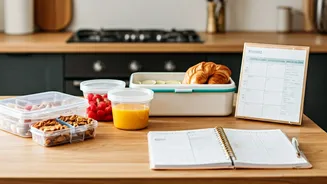Prep the Night Before
One of the most effective strategies involves getting prepared the night before. This encompasses several key tasks. Firstly, lay out clothes for both
yourself and your children. This simple step eliminates morning decision fatigue. Secondly, pack lunches and snacks. Preparing these in advance saves valuable time in the morning rush. Thirdly, gather school bags, homework, and any essential items needed for the next day. A designated spot for these items ensures nothing is forgotten. Fourthly, establish a bedtime routine that allows for sufficient sleep. Adequate rest is crucial for children's focus and mood. Lastly, have a family meeting to discuss and delegate tasks, making mornings a team effort.
Early Rise, Calm Start
Waking up before the kids is a game-changer. This allows you to ease into the day. Use this extra time to prepare coffee, check emails, or do some gentle stretches. When the children wake, you're already in a calm and prepared state. This sets a positive tone for the entire morning. A relaxed parent often translates to relaxed children. This also provides a buffer against unexpected delays. It grants you the time to handle any unforeseen issues without causing a panic. Furthermore, using this quiet time to create a personalized morning ritual, such as listening to music or reading, can help you feel grounded and energized.
Breakfast Strategies Revealed
Breakfast is vital, but getting everyone fed can be tricky. Batch-cooking breakfast items on the weekend helps streamline weekday mornings. Prepare a large batch of oatmeal, pancakes, or breakfast burritos. Store them in the fridge or freezer for quick reheating. Quick-prep breakfast options are also very beneficial. Yogurt parfaits, smoothies, or a bowl of cereal with fruit are all simple, nutritious choices. Involve children in the breakfast process. Assign them age-appropriate tasks like setting the table or washing fruit. This encourages responsibility and makes them feel more involved. Moreover, keeping healthy, grab-and-go options like fruit, yogurt, or hard-boiled eggs readily available can save time and prevent hunger-induced meltdowns.
Organized Bathroom Routines
Bathroom time can become a bottleneck during busy mornings. Establish a clear bathroom schedule. Create a timetable, especially if multiple children are sharing a bathroom. Assign each child a specific time slot to brush their teeth, shower, and get ready. Prepare toiletry kits the night before, containing toothbrushes, hairbrushes, and any other necessary items. This helps kids find things easily. Encourage independence by teaching children the steps of their morning routine. For example, show them how to brush their teeth correctly, comb their hair, and choose their clothes. Make the process fun by playing music while they get ready. This can create a more pleasant atmosphere and get kids moving. Lastly, keep everything organized with designated storage for each child's items to avoid clutter and confusion.
Dress-Up Delights & Decisions
Reduce the morning scramble by planning outfits in advance. Have children choose their clothes the night before. This eliminates the morning debate about what to wear. If your kids struggle with choosing, establish guidelines such as a 'uniform' or pre-selected outfit options. Keep clothing organized to make the selection process smoother. Use labeled drawers or compartments for each child's clothes. This helps them find what they need easily and promotes independence. Teach kids basic clothing care skills. Show them how to fold clothes and put them away to keep everything organized. Consider creating a 'dress-up station' with accessories like hats or scarves. This will help make getting ready more fun. Ensure your children dress in appropriate attire for the weather and their day's activities.
School Essentials Checklist
Avoid last-minute panics by creating a school essentials checklist. List everything your children need for school, like backpacks, books, stationery, and any specific items. Keep this checklist in a visible spot, such as the refrigerator or command center. Use the checklist when packing backpacks and bags the night before. Make sure children review their bags before bed. This encourages them to take ownership and ensures nothing important is missed. Involve kids in packing their own bags. This teaches them responsibility and helps them understand what they need. If needed, provide visual prompts for younger children by including picture cards representing school items. Revisit and update the checklist regularly, especially at the start of each school year or season, to include changing needs.
Communicate Clearly, Kindly
Establish open and clear communication with your children. Before bed, have a brief discussion about the next day's schedule and expectations. This can alleviate any morning anxieties. Clearly communicate the morning routine steps and expectations. Use positive language and avoid nagging or yelling. Offer gentle reminders instead. Make sure everyone knows the timetable for the morning and that there are set times for each task. Maintain a calm and consistent tone. Respond patiently to your children's questions and concerns. Create a space where kids feel comfortable expressing themselves. Schedule regular family meetings to address any morning issues. This gives a chance for everyone to express opinions and work together to find solutions. Celebrate small victories with praise and rewards.
Embrace Flexibility & Adapt
Be prepared to adjust your morning routine as needed. No matter how well you plan, unexpected events might still happen. Accept that delays or changes are inevitable. Have a backup plan in place for common issues, such as a missed bus or a forgotten assignment. Adapt the routine to suit your children's ages and personalities. What works for one child may not work for another. Be open to trying new strategies and making adjustments. Encourage your kids to participate in this process. Seek their feedback. Regularly evaluate the effectiveness of the current routine and identify areas for improvement. Be prepared to let go of perfection. Recognize that the goal is to create a functional and relatively stress-free morning, not to achieve a flawless one. Celebrate small victories, and learn from setbacks.
Involve Children, Empower Them
Involve children in the morning routine to instill a sense of responsibility and independence. Assign age-appropriate tasks. Younger kids can help set the table, while older children can prepare their lunches. Allow children to make some choices. Give them options, such as what to eat for breakfast or which shirt to wear. This provides a sense of control. Teach children the importance of time management. Use timers or visual cues to help them stay on track with their tasks. Celebrate their successes and efforts. Offer positive reinforcement. Be patient and understanding, and recognize that it takes time for children to master new skills. Regularly discuss the morning routine with your kids. Seek their feedback. If necessary, make adjustments to the routine to accommodate their needs and preferences.
Utilize Time-Saving Tools
Employ tools to boost morning efficiency. Use a digital calendar or whiteboard to display the day's schedule. This helps everyone stay informed. Set up a central command center. This can include a calendar, a message board, and a designated spot for keys, wallets, and other essentials. Use timers for tasks like brushing teeth or getting dressed. This gives children a sense of time and helps them stay focused. Prep your car the night before. Make sure it's fueled, packed with essentials, and ready to go. Consider using a smart speaker or app to play calming music or provide reminders. Explore apps or online tools. These tools can help manage schedules and communicate with family members. Delegate tasks whenever possible. Get help from your partner or older children. This will ease the workload and make the morning more collaborative.












